|
|
|
Sort Order |
|
|
|
Items / Page
|
|
|
|
|
|
|
| Srl | Item |
| 1 |
ID:
119270
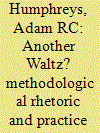

|
|
|
|
|
| Publication |
2012.
|
| Summary/Abstract |
Transnational human rights networks span the globe, and have become more numerous and influential since the 1970s. Yet we still know relatively little about the strategic interaction between transnational advocates and their targeted state actors. Focusing on such a strategic interaction, we argue that transnational advocacy is less a diffusion of authority away from state actors than a change in the ways in which the politics of accountability is conducted between sophisticated state and non-state actors. In particular, we show that targeted actors (e.g. impugned states) can develop their own discursive capacities to challenge the facts and interpretations offered by transnational advocates and 'turn the tables' on them, expanding the scope of accountability to include the conduct of NGOs themselves. Empirically, we examine the efforts made by Human Rights Watch (HRW) to make the Israel Defense Forces (IDF) accountable during the Second Lebanon War of 2006 and the Gaza war of 2008-9.
|
|
|
|
|
|
|
|
|
|
|
|
|
|
|
|
| 2 |
ID:
133768


|
|
|
|
|
| Publication |
2014.
|
| Summary/Abstract |
Over the years, China's Lancang dam cascade has been the target of widespread contestation arising mainly from an evolving network of dam opponents. Operating across borders, these activists play an increasingly prominent role in the transboundary governance of the Lancang-Mekong River, working to curb China's hydropower expansion and hold its dam developers to account.
|
|
|
|
|
|
|
|
|
|
|
|
|
|
|
|
| 3 |
ID:
181646


|
|
|
|
|
| Summary/Abstract |
Turkey imposed open-ended blanket curfews beginning in 2015, resulting in gross human rights violations. This article analyzes strategies employed by domestic activists to address violations. It explains what worked, what did not, and why. It argues that longstanding barriers to mass mobilization, including some that predate de-Europeanization, shaped activists’ mobilization strategies. Because of an unfavorable domestic environment, activists used a boomerang strategy, disseminating information to international allies who applied pressure to Turkish officials. This strategy effectively mobilized transnational human rights networks, resulting in a continuous and concerted effort by international actors to persuade Turkish officials to protect human rights while countering terrorism. Nevertheless, the boomerang strategy and a legal strategy to file applications with the European Court of Human Rights ultimately failed to generate a shift in policy. The article concludes with a discussion about the factors that contributed to this outcome.
|
|
|
|
|
|
|
|
|
|
|
|
|
|
|
|
| 4 |
ID:
131565
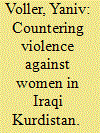

|
|
|
|
|
| Publication |
2014.
|
| Summary/Abstract |
The struggle against gender-based violence in the Iraqi Kurdistan Region has witnessed some significant achievements since the late 1990s. A subject long excluded from public discourse in the region, it has now moved increasingly into the mainstream, compelling the Kurdistan Regional Government (KRG) to take legal and practical measures against such practices as honor killings, female genital mutilation, and domestic violence. This article traces the sources of these shifts in the KRG's stance, looking especially at the role of transnational women's rights networks in the region. It highlights these networks' successful strategy of binding their cause to the KRG's endeavor to legitimize and consolidate its contested sovereignty over the Kurdistan Region. In doing so, the paper addresses an underexplored subject in the literature on women's rights campaigns in the Kurdistan Region and contributes to the study of transnational advocacy as a source of normative change.
|
|
|
|
|
|
|
|
|
|
|
|
|
|
|
|
| 5 |
ID:
113939


|
|
|
|
|
| Publication |
2012.
|
| Summary/Abstract |
Transnational advocacy organizations are influential actors in the international politics of human rights. While political scientists have described several methods these groups use - particularly a set of strategies termed 'information politics' - scholars have yet to consider the effects of these tactics beyond their immediate impact on public awareness, policy agendas or the behavior of state actors. This article investigates the information politics surrounding sexual violence during Liberia's civil war. We show that two frequently-cited 'facts' about rape in Liberia are inaccurate, and consider how this conventional wisdom gained acceptance. Drawing on the Liberian case and findings from sociology and economics, we develop a theoretical framework that treats inaccurate claims as an effect of 'dueling incentives' - the conflict between advocacy organizations' needs for short-term drama and long-term credibility. From this theoretical framework, we generate hypotheses regarding the effects of information politics on (1) short-term changes in funding for human rights advocacy organizations, (2) short-term changes in human rights outcomes, (3) the institutional health of humanitarian and human rights organizations, and (4) long-run outcomes for the ostensible beneficiaries of such organizations. We conclude by outlining a research agenda in this area, emphasizing the importance of empirical research on information politics in the human rights realm, and particularly its effects on the lives of aid recipients.
|
|
|
|
|
|
|
|
|
|
|
|
|
|
|
|
| 6 |
ID:
131511
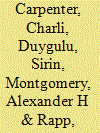

|
|
|
|
|
| Publication |
2014.
|
| Summary/Abstract |
Through a series of focus groups with human security practitioners, we examined how powerful organizations at the center of advocacy networks select issues for attention. Participants emphasized five sets of factors: entrepreneur attributes, adopter attributes, the broader political context, issue attributes, and intranetwork relations. However, the last two were much more consistently invoked by practitioners in their evaluations of specific candidate issues. Scholars of global agenda setting should pay particular attention to how intranetwork relations structure gatekeeper preferences within transnational advocacy spaces because these help constitute perceptions of issues' and actors' attributes in networks.
|
|
|
|
|
|
|
|
|
|
|
|
|
|
|
|
| 7 |
ID:
125901
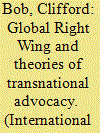

|
|
|
|
|
| Publication |
2013.
|
| Summary/Abstract |
In recent decades, there have been many international campaigns on numerous issues. In turn, scholars have analysed the activist networks promoting human rights, environmental quality and global justice, developing theories of transnational advocacy, strategies and outcomes. However, analysts have seldom noted that the 'progressive' networks on which these theories have been based seldom act unopposed. Instead, on numerous global issues leftwing groups face fierce opposition from networks of rightwing activists. This article provides examples of such clashes, focusing on these understudied conservative networks. In addition, it outlines a theory for understanding the conflict of networks over many policy issues.
|
|
|
|
|
|
|
|
|
|
|
|
|
|
|
|
| 8 |
ID:
073520
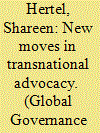

|
|
|
|
|
| Publication |
2006.
|
| Summary/Abstract |
Activists involved in human rights advocacy across borders may share common interests in changing the status quo¾but they do not always agree on the rights centrally at issue, nor the best strategy for promoting and protecting them. This is particularly true in campaigns in which "economic rights" claims emerge. Two new mechanisms I develop in this article shed light on the complexities of transnational advocacy and norms evolution. Two case studies offer insights into the operationalization of the mechanisms: a campaign to prevent child labor inBangladesh, and a campaign to prevent employment discrimination against pregnant workers in Mexico.
|
|
|
|
|
|
|
|
|
|
|
|
|
|
|
|
| 9 |
ID:
088918


|
|
|
|
|
| Publication |
2009.
|
| Summary/Abstract |
In May 2002, China decide not to repatriate
north
korean asylum seekers who fled to Shenyang.The decision was not only in contravention of the 1986 North Korea-China bilateral repatriation agreement, but also constituted China's repudiation of its policy denying refugee status to North Koreans in China.
|
|
|
|
|
|
|
|
|
|
|
|
|
|
|
|
|
|
|
|
|